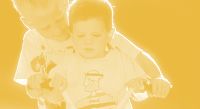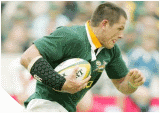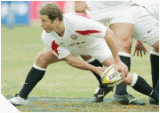



Bristol Knee Clinic


| + home | |
| + news | |
| + research | |
| + patient information | |
| + the clinic | |
| + the surgeon | |
| + sport physiotherapy | |
| + sports advice | |
| + medico legal | |
| + products | |
| + resources | |
| + contact | |
| + maps | |
| + directions | |
| + site map |
The Bristol Knee Clinic |
Rugby Advice
Links
The way rugby is played is changing which makes for new physical demands on the players. This has resulted in a change in the nature of injuries. Increased emphasis on fitness training and a faster match tempo has lead to a rise in the number of muscle and tendon injuries. Frequent physical contact results in a high incidence of collision injury with the upper limbs and head most frequently injured. With changes to the rules for the scrum serious neck injuries are less common.
Shoulder Injuries
Common shoulder injuries include shoulder dislocations and injury to the acromio-clavicular joint or fractures of the clavicle. Shoulder dislocations usually occur in tackling and acromio-clavicular joint injuries when falling onto the tip of the shoulder. Whilst acromio-clavicular injuries cannot really be avoided, the chance of shoulder dislocations may be reduced by weight training and muscle strengthening in training and attention to correct tackling technique. After a shoulder dislocation, careful rehabilitation retraining and strengthening is necessary to avoid a subsequent re-dislocation of the shoulder joint.
Ankle Sprains
A sprained ankle is one of the most common injuries suffered. It is usually caused when the ankle is twisted inwards. As well as damage to the joint capsule, the ankle joint ligaments can also be damaged. During the first few days treatment should consist of rest, ice, compression and elevation. Ice packs for a period of 20 minutes every couple of hours may help with the pain and swelling. Anti-inflammatory medication may also be helpful in reducing pain and swelling. It is important not to put too much weight on the damaged ankle, so walking should be avoided if it is painful. Medical attention should be sought from a hospital, orthopaedic surgeon or a physiotherapist, depending on the extent of the injury. Taping and bracing the ankle can help to reduce the risk of recurrent subsequent ankle sprains.
Knee Injuries
Knee injuries are common during rugby and are often significant and serious. Injuries commonly sustained include meniscal or cartilage tears, cruciate and collateral ligament injuries and tendonitis from over training. Acute injuries with knee swelling and instability should be treated by rest, splintage, non-weight bearing. If necessary an urgent investigation from an orthopaedic surgeon with a special interest in knee surgery and sports injuries should be sought. Further investigation commonly includes an MRI Scan.
For more advice on rugby injuries or any other orthopaedic problem, visit the web site www.orthopaedics.co.uk or contact Mr David Johnson's office on 0117 9706655 to arrange an appointment in his clinics in Bristol, Newport or Harley Street, London.
+ Physiotherapy
+ Health products
+ Orthopaedic Resources
+ top
<<Back to Sports Advice


© The Bristol Orthopaedics and Sports Injuries Clinic 2003. The Bristol Knee Clinic is a trading name of the Bristol Orthopaedic Clinic Ltd. privacy / copyright | contact | Powered By Create Medical



